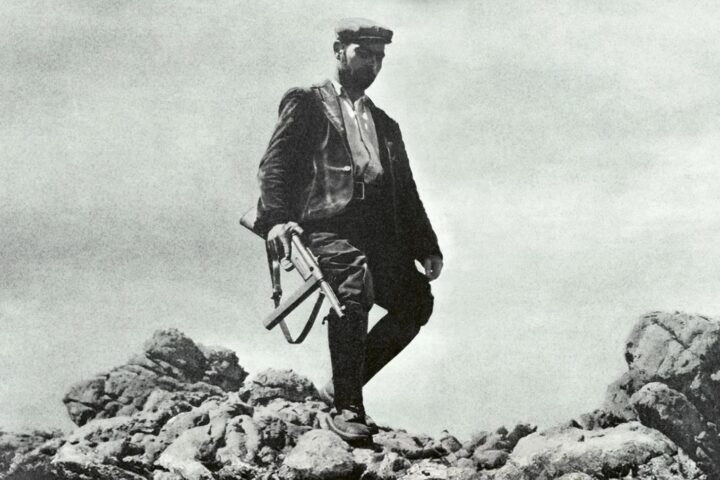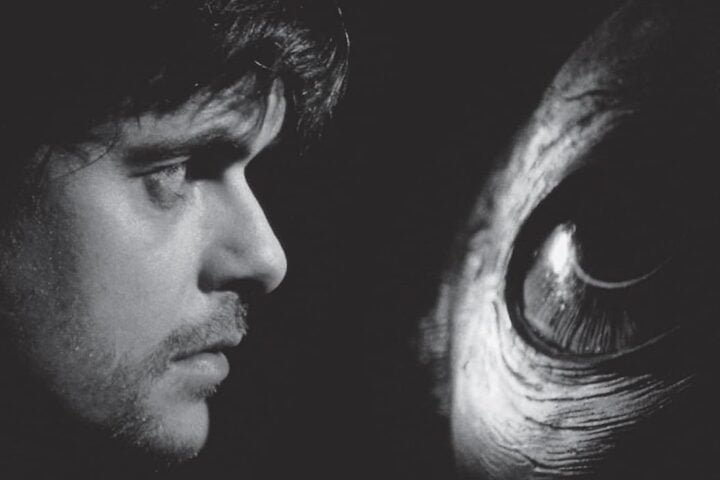Orson Welles first rose to fame with revisionist takes on William Shakespeare’s work, among them a 1937 theatrical production of Julius Caesar set in a fascist state and, a year earlier, Voodoo Macbeth, which relocated the plot of Macbeth to Haiti and featured an entirely black cast. His 1948 film adaptation of the play is similarly faithful in its use of the original text, with the actors going as far as to adopt thick highland brogues. The film likewise transposes Welles’s theatrical experimentations into cinematic terms, existing largely as a showcase for the auteur’s arcane, fussy expressionism, as well as the many cultural quirks borne of a peripatetic life. For example, in the opening scene in which Macbeth (Welles) meets the three witches, they make a facsimile of the lord out of clay, a voodoo-like touch that could be a subtle nod to Welles’s vaunted all-black stage production.
Fred Ritter’s art direction is at once expressionistic and minimal. Forced to reuse old western sets on Republic’s lot to save money, Ritter converts rocky desert landscapes into nightmarish, dank swamps. Castles, which don’t appear to have been built by human hands, seem to rise naturally from the moors. Stone walls are slick with slime and moss, and towers are indistinguishable from craggy rock formations. This is a hard realm for hard men, one where the clay idol of Macbeth is less a symbol than a metaphor for the disgusting earth that birthed him. Nearly everyone is shrouded in mist and sweat. This is a fetid vision of the play’s setting, albeit of a sort that only pulls focus onto the inherent brutality of the text. Indeed, some of the biggest changes to the play lie in the material excised for being too violent or risqué for the Hays Office.
As with the wartime Shakespeare adaptations of Laurence Olivier, Welles’s film is rooted in the arch theatricality of the stage but livened by a shrewd calculation of the ways that cinema can enrich and imagine the Bard’s text. Lady Macbeth (Jeanette Nolan), for example, is regularly filmed from low angles, emphasizing the authority she wields over all those around her, especially her husband, who usually appears below her in the frame. Dressed in sexless black, Lady Macbeth looks like a specter of evil, focusing her entire being on the thirst for power at the expense of any other pleasure. Scenes of violence typically play out in shadows and with clever edits, as in the Thane of Cawdor’s execution, which is timed so that the swing of the executioner’s axe cuts to a military drummer’s mallet striking his instrument.
Identifying and magnifying the skeletal nastiness of the text, Welles lays out the blueprint for future revisionist takes on Shakespeare’s works. Both Roman Polanski’s nihilistic rendition and Justin Kurzel’s arty 2015 update pull much from what Welles does here. Olivier may have brought out the fulsome color and hard-won optimism of his adaptations during wartime, but Welles plunges into darkness to reckon with an uncertain postwar world. Shot in less than four weeks, the film has a rugged, spartan nature to it, and though it may be one of the director’s minor achievements, that its enduring unpleasantness lends it a modernity that has yet to fade.
Image/Sound
Kino Lorber offers Macbeth in both its 119-minute 1948 roadshow edition and the 85-minute 1950 re-release available on separate 1080p Blu-ray discs. The former comes in a fresh 4K restoration from Paramount Pictures that looks phenomenal, with a dramatic uptick in the depth and clarity of the image, revealing fine details like sweat-beaded brows and painted-on makeup. The omnipresent blacks of John L. Russell’s evocatively expressionist cinematography are profound and entirely uncrushed. Audio comes in a two-channel mono mix. Dialogue and Jacque Ibert’s resonant score stand out nicely, and if you need subtitles for the deep Scottish burrs that the actors adopt, they’ve been helpfully supplied by Kino.
Extras
The choice new supplement here is another deeply researched and judiciously structured commentary track by novelist and film historian Tim Lucas, who does an excellent job of contrasting Orson Welles’s film with other cinematic adaptations by the likes of Roman Polanski and Joel Coen. Lucas also helpfully points out the alterations and emendations that Welles made to Shakespeare’s original text. Beyond that, he offers a finely nuanced reading of the material, especially playing up the mother-son dynamic between Macbeth and Lady Macbeth, which he suggests stems from Welles’s relationship with his own mother.
Kino also carries over most of the extras that appeared on Olive’s Signature Edition of the film from 2016. There’s an informative and wide-ranging second commentary track by Welles scholar Joseph McBride. Professor Michael Anderegg covers Welles’s other Shakespeare adaptations before zeroing in on Macbeth, and includes some intriguing bits about the film’s Christian symbolism. Peter Bogdanovich elaborates on his personal memories of Welles, and UCLA preservationist Robert Gitt talks about working on the restoration of Welles’s intended version of the film, which for years had been thought lost. Finally, archivist Marc Wanamaker provides a brief overview of Republic Pictures, the B-movie studio that produced the film.
Overall
Orson Welles’s expressionistic adaptation of Macbeth gets a phenomenal 4K transfer and a solid slate of extras, including a brand new commentary track.
Since 2001, we've brought you uncompromising, candid takes on the world of film, music, television, video games, theater, and more. Independently owned and operated publications like Slant have been hit hard in recent years, but we’re committed to keeping our content free and accessible—meaning no paywalls or fees.
If you like what we do, please consider subscribing to our Patreon or making a donation.


